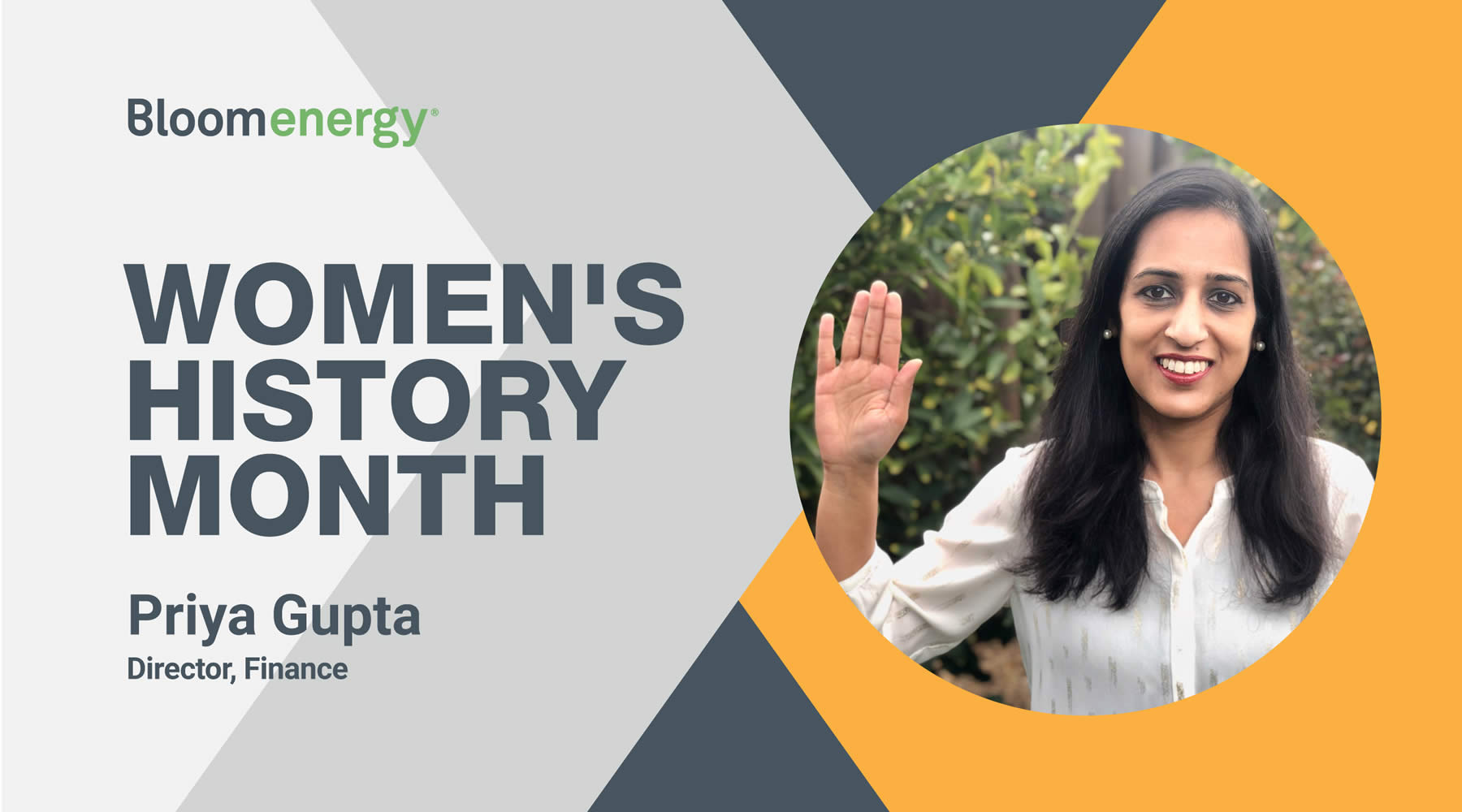Here at Bloom, our very own women shine in leadership roles across our business.
That’s why in honor Women’s History Month we’ll be spotlighting many of the talented women working at Bloom Energy.
In this four-part series, women of Bloom will share their unique stories and perspectives alongside the International Women’s Day theme of #ChooseToChallenge, showing solidarity and commitment to challenging inequality, calling out bias, developing a platform for discussion, and helping to forge an inclusive world. Each year an annual IWD campaign theme is celebrated and continues all year long to unify direction and galvanize activity by providing a meaningful framework to connect and amplify action. Enjoy the third installment in our series below.
Priya Gupta – Director, Finance
Priya Gupta is a skilled finance professional with more than 10 years of Corporate FPA experience. She has led and developed teams to perform various finance activities, such as public reporting, P&L, balance sheet and cash forecasting, scenario planning, budget vs actual variance analysis, capital planning and approvals, product life cycle support, financial planning system implementations, business drivers analysis and support for various teams . Prior to joining Bloom, Priya worked in various positions at Archer Daniels Midland Company. Priya holds an MBA from Krannert School of Management at Purdue University, a master’s degree in economics from Panjab University and bachelor’s degree in economics from Delhi University.
Don’t forget to check out past features in the series on Marisa Blackshire, senior director, cnvironmental compliance and EH&S, and Jessica Mahler, director, mechanical engineering, and follow along with the Bloom Energy social channels as we continue to share featured women in honor of Women’s History Month.
This year’s theme for International Women’s Day is #ChooseToChallenge. How do you choose to challenge and call out gender bias and inequality, celebrate women’s achievements and/or help create an inclusive world?
I #ChooseToChallenge by being myself and not giving in to any stereotypes. By being confident and secure in my abilities to stand up and speak for myself and express thoughts and opinions without worrying about how that is perceived; thereby, paving a way for other women to feel comfortable speaking up for themselves and expressing themselves more freely as they grow in their career path.
When it comes to creating an inclusive world, I think that has two components. First, at work, I believe we can create an inclusive world by adding a little empathy and compassion to our work culture to understand our teammates and colleagues a little better, understand what drives them, what their individual challenges are, and recognizing how we can foster career growth.
Second, at home, I have two young kids, a boy and a girl, and I want them to grow up and be whatever they want to be, and not have their decisions influenced by gender bias. So at home, we encourage them both to explore activities based on their unique personalities and interests instead of being driven by their gender. For my daughter, in particular, I keep a conscious mind to encourage her free spirit and provide strong women role models through books, family, and friends.
Renewable energy employs about 32% women, compared to 22% in the energy sector overall. What can the energy industry do to grow inclusion and diversity?
With regards to diversity, I think the energy industry should partner with educational institutions to encourage a diverse student group, which would then feed into the industry as candidates. The pool needs to be large and diverse to start with. Within the industry, there should be strong role models for women to look up to and take inspiration from to encourage more women to enter the industry. For inclusion, I think it’s important to create a corporate culture that focuses on meritocracy, skill, talent development, and collaboration.
How can men be better allies to women in the workforce?
For men to be better allies to women in the workforce, they need to look past any deep subconscious bias they have, or expectations of how a woman should act, and then take conscious action after addressing the bias. The challenge though is that most times men don’t even realize they have a bias because it is so ingrained in the subconscious mind, thus creating an awareness of the bias is equally important.
However, I think the question should extend further and we should ask how men can support women in general. I have been fortunate to have men as great allies at work; however, that by itself would not be enough if I did not have support at home from my husband. Having him be a true and equal partner at home, from dropping or picking up kids, taking them to their tennis classes, or getting meals prepped, has helped me manage my “mom guilt” and given me the freedom to do the work I love to do and not feel like I am failing as a wife or a mother. Beyond the role of supporting husbands, men can be very strong allies in their role as fathers, by encouraging their daughters to follow their dreams and take on the world without conforming to any norms.
In your everyday role, how do you work toward dismantling gender stereotypes?
I think the most common stereotype I have witnessed is that if a woman shows emotional sensitivity and concern for others, then they are perceived as less competent. Another common one is that if a woman shows confidence, dominance, and ambition, then they are perceived as bossy, difficult, arrogant, or aggressive. I work towards dismantling these stereotypes by being myself, which means sometimes I show the emotional sensitivity, and sometimes I show the confident, dominant and ambitious part of me without worrying about the perceptions or backlash from it. At the end of the day, I stay true to myself and do my very best each and every day, and eventually, people see the underlying competence and you break through perceptions and stereotypes.
What is one of the toughest career challenges that you have faced? How did you overcome and what lessons did you learn to help you progress forward?
I don’t have one example that stands out as particularly challenging. However, I would say in my career there have been some good days and some not so good. The days that are not so good are usually challenging for the same reasons – you are trying to balance a lot at the same time. Sometimes we go into a “super-woman” at work or “super-mom” at home complex, or both together, and take on more than we can handle at a point in time. For me, this usually leads to stress and the quality of work suffers. Over time, I have learned and I think I can manage better now because I have learned to identify when work gets to be too much and to ask for help or prioritization. I have learned the importance of open communication with your managers to work together on finding the right balance. Second, I have started planning better for the times that I know will be much busier than normal – planning tasks as well as mentally preparing myself for that busy time. Third, I am attempting to consciously de-stress, create a work-life balance as much as possible, spend quality time with my family on a daily basis and find some “me-time” for my hobbies and interests.



